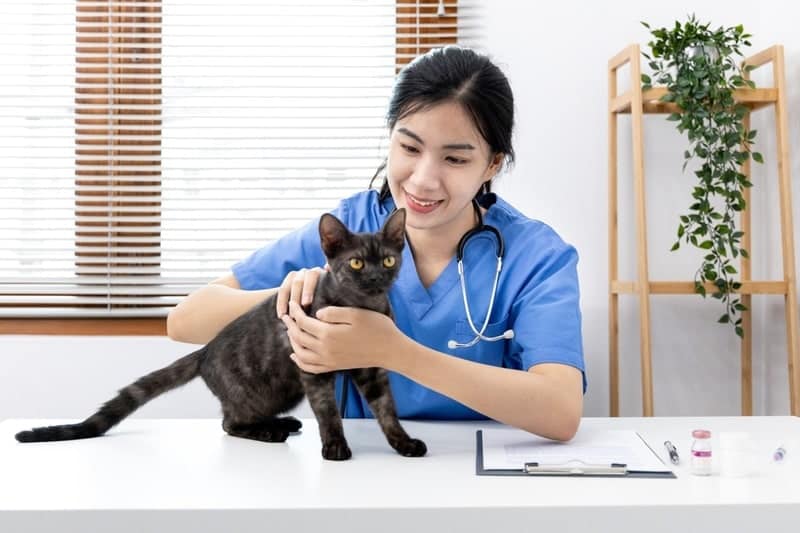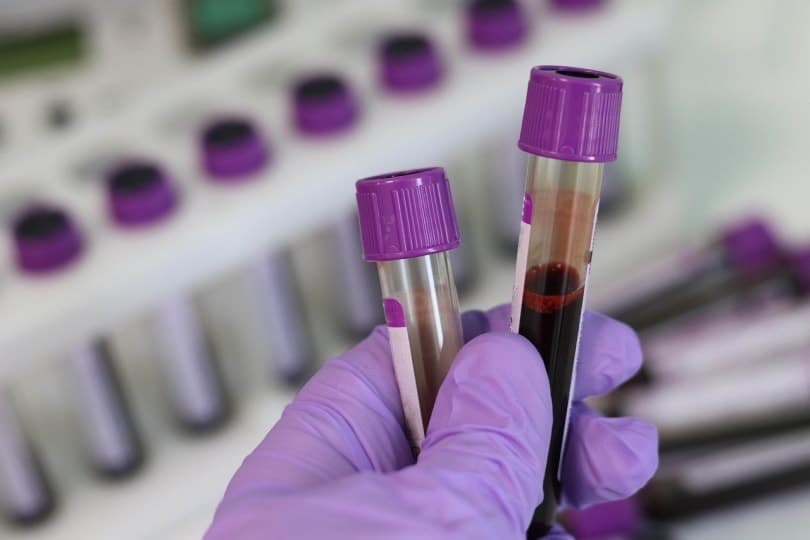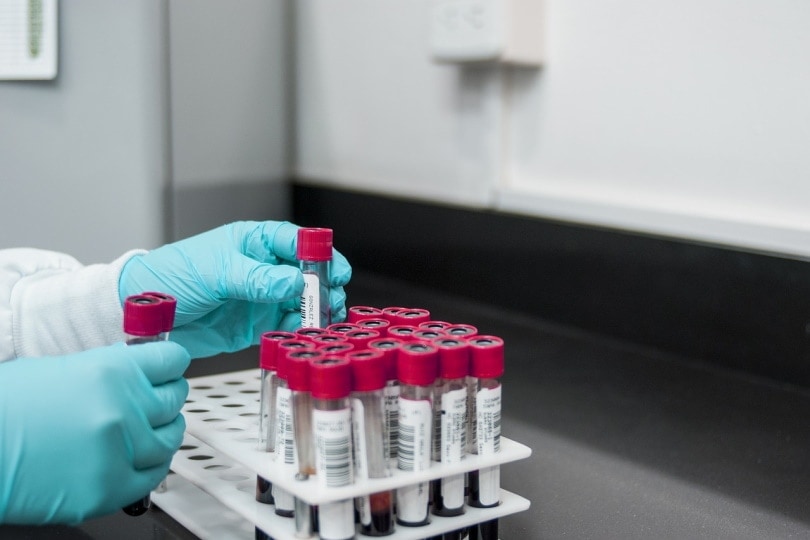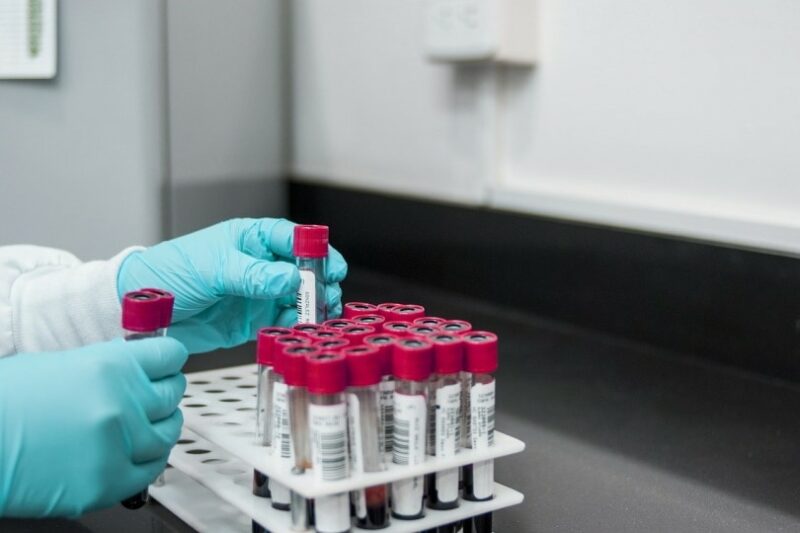If your vet asks for blood tests, it’s easy to get confused. After all, there are many types of blood tests, and on the patient’s end, they all look the same. Your vet draws a little bit of blood, and a while later, they come back to tell you if everything is all right. However, each type of blood test has a different purpose and cost. A blood test for a cat can cost anywhere from $15-$250 depending on the purpose of the blood test. Being informed about the different kinds of blood tests can help you know what to expect.
The Importance of Blood Tests
Blood says a lot about health. Examining a blood sample can tell you about your cat’s thyroid hormones, glucose levels, white and red blood cell counts, and more. These clues can help you narrow down a health issue in your cat or diagnose a problem before signs become visible.
Vets usually order a blood test if your cat shows signs of feline leukemia, a thyroid disorder, feline diabetes, or unknown health issues that blood tests can detect. Blood tests are usually required before surgeries and other medical procedures. Some vets also recommend annual blood tests after your cat reaches a certain age.

How Much Does a Blood Test Cost?
The cost of a blood test varies widely. Several tests fall under blood work, and each has a different cost. The cheapest blood test is a blood glucose test, which measures blood sugar levels. This often costs between $20 and $50. Other blood tests include glucose, white cell, cell chemistry, and FIV tests.
If your cat needs several tests, they are often combined into a bloodwork panel. This can cost anywhere from $100 to $300, depending on the tests needed. For example, this veterinary office in Boise, Idaho, provides a basic blood panel for $110 and a more extensive panel for $160.
One of the factors that influence the cost most is whether your vet has the capacity to analyze the results in-house or whether it will be sent to a specialized lab. Larger veterinary clinics will be more likely to have specialized equipment.
Sending blood to an outside lab increases the price by as much as $100, so if your vet quotes you a higher price than you expect, it might be why. You might consider asking for quotes from other vets in your area if you feel like the price of a test is too high.
Here are some of the most common types of blood tests and estimated prices:
| Blood test | Purpose | Cost |
| Blood glucose | Measures blood sugar and diagnoses feline diabetes | $15–50 |
| CBC | Counts white blood cells to measure immune health | $30–75 |
| FELV/FIV test | Diagnoses feline leukemia | $75–150 |
| PCV | Measures red blood cells to diagnose disease | $30–100 |
| T4 | Measures thyroid hormone levels | $30–100 |
| Serum chemistry | Measures electrolytes, enzymes, and blood proteins. Usually combined with other tests. | $100–250 |
Additional Costs to Anticipate
Because blood tests are used as a diagnostic tool, they often come hand-in-hand with other tests. For example, your vet might combine blood and urine tests, offering both together at a slightly higher price.
If your cat’s blood test is part of a routine checkup, you can also expect to pay office visit fees and fees for other parts of a checkup, like physical examinations. These fees often run at around $50–100.
Blood test results can lead to the diagnosis of several health issues. If your cat is suffering from unusual signs, a blood test is often the first step that gives your vet direction for more extensive treatment.

How Often Do Cats Need Blood Work?
The frequency of blood work depends on various factors. Vets often recommend routine bloodwork annually or once your cat reaches a certain age. This can help you diagnose problems before the effects become visible. However, many blood tests are usually performed as needed.
One of the most common reasons to do blood work is to prepare for surgery. This ensures that your cat doesn’t have health complications that will affect anesthesia or cause unexpected reactions. The other reason to do a blood test is if your vet is trying to diagnose a health problem. Your cat might need one specific blood test, like a test for feline leukemia, or your vet might recommend a combined test.
Does Pet Insurance Cover Blood Tests?
Many pet owners are turning to pet insurance to help cover medical costs and keep their pets safe. Every pet insurance policy is different, and many providers offer customizable plans to help you choose the coverage you need.
It’s difficult to generalize about what is covered by insurance. However, because blood tests are a routine part of vet work, most pet insurance covers most blood tests. Some policies cover every type of blood test, while others cover only the most common tests. It’s essential to check with your insurance to determine the specific types of tests they cover.

Blood Tests and Your Cat’s Health
Although you might not be able to avoid blood work, many of the health issues diagnosed by blood tests are affected by your cat’s overall health. Feeding your cat healthy, nutritious food and avoiding overfeeding can minimize heart, blood, and thyroid problems diagnosed with blood tests.
It’s also crucial to give your cat proper preventative veterinary care. Feline leukemia is a common illness in cats diagnosed by a blood test. Feline leukemia can be life-threatening, but a vaccine can protect your cat.
Conclusion
As you can see, the cost of a blood test depends on the type of tests your cat needs and your vet’s capabilities. If your cat needs bloodwork, being informed about the kinds of tests your vet recommends and what the results could mean can help you make wise decisions about medical care. Blood work can be a little scary for you and your cat, but it is an integral part of keeping your cat healthy.
Featured Image Credit: fernandozhiminaicela, Pixabay













